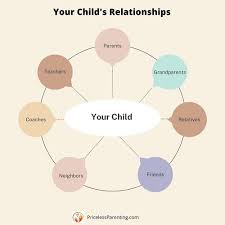The Importance of Developing Strong Relationship Skills
Relationships form the foundation of our personal and professional lives. Whether it’s with family, friends, colleagues, or romantic partners, the ability to build and maintain healthy relationships is crucial for our well-being and success.
Effective Communication
One of the key components of strong relationship skills is effective communication. Being able to express your thoughts and feelings clearly, listen actively to others, and resolve conflicts peacefully are essential for fostering positive connections with others.
Empathy and Understanding
Empathy is another vital aspect of relationship skills. By putting yourself in someone else’s shoes and understanding their perspective, you can build trust and deepen your bond with them. Showing compassion and support towards others can go a long way in strengthening relationships.
Conflict Resolution
Conflicts are inevitable in any relationship, but how we handle them can make a significant difference. Developing conflict resolution skills, such as staying calm, listening without judgment, and finding mutually beneficial solutions, can help resolve disputes constructively without damaging the relationship.
Building Trust
Trust is the cornerstone of any successful relationship. By being honest, reliable, and consistent in your actions, you can build trust with others over time. Trust allows for open communication, mutual respect, and a sense of security within the relationship.
Setting Boundaries
Setting healthy boundaries is essential for maintaining self-respect and preserving the integrity of your relationships. Clearly defining what is acceptable and what is not helps establish mutual respect and ensures that both parties feel comfortable and valued within the relationship.
In conclusion, developing strong relationship skills is crucial for cultivating meaningful connections with others. By honing your communication abilities, practising empathy and understanding, mastering conflict resolution techniques, building trust, and setting boundaries effectively, you can foster healthy relationships that enrich your life in countless ways.
Understanding Relationship Skills: Key Qualities and Concepts Explained
- What are 5 qualities of a good relationship?
- What are relational skills?
- What are positive relationships?
- What is strong relationship skills?
- What are the 5 relationship skills?
What are 5 qualities of a good relationship?
When considering the qualities of a good relationship, five key aspects stand out. Firstly, effective communication plays a crucial role in fostering understanding and connection between individuals. Secondly, trust forms the foundation of a strong relationship, allowing for openness and reliability. Thirdly, mutual respect is essential for acknowledging each other’s value and boundaries. Empathy, as the fourth quality, enables partners to empathise with one another’s emotions and perspectives. Lastly, shared values and goals create a sense of unity and alignment within the relationship, guiding both individuals towards common aspirations and growth together. These five qualities collectively contribute to the strength and longevity of a healthy and fulfilling relationship.
What are relational skills?
Relational skills encompass a range of abilities that enable individuals to form, nurture, and maintain healthy relationships with others. These skills include effective communication, active listening, empathy, conflict resolution, trust-building, and boundary-setting. By mastering relational skills, individuals can navigate interpersonal interactions with greater ease and build strong connections based on mutual respect, understanding, and support. Developing these skills is essential for fostering harmonious relationships in both personal and professional settings, ultimately enhancing overall well-being and satisfaction in life.
What are positive relationships?
Positive relationships are those built on mutual respect, trust, and understanding between individuals. In positive relationships, communication is open and honest, conflicts are resolved peacefully, and both parties feel valued and supported. Empathy, compassion, and active listening are key components of fostering positive connections with others. These relationships bring joy, fulfilment, and a sense of belonging to our lives, enriching our well-being and overall happiness. By nurturing positive relationships, we create a supportive network that enhances our emotional resilience and contributes to our personal growth and development.
What is strong relationship skills?
Strong relationship skills encompass a range of abilities that enable individuals to build and maintain healthy and meaningful connections with others. These skills include effective communication, empathy, conflict resolution, trust-building, and boundary-setting. Strong relationship skills involve being able to express oneself clearly, listen actively to others, understand different perspectives, resolve conflicts peacefully, build trust through honesty and reliability, and establish boundaries that promote mutual respect and understanding. Developing these skills is essential for fostering positive relationships in both personal and professional settings, ultimately leading to greater satisfaction, harmony, and fulfilment in interactions with others.
What are the 5 relationship skills?
When it comes to relationship skills, there are five key aspects that are often highlighted as crucial for building and maintaining healthy connections with others. Effective communication tops the list, encompassing the ability to express oneself clearly, listen attentively, and resolve conflicts peacefully. Empathy and understanding play a significant role in fostering empathy towards others’ perspectives and feelings. Conflict resolution skills are essential for navigating disagreements constructively. Building trust through honesty, reliability, and consistency is fundamental in any relationship. Lastly, setting healthy boundaries helps establish mutual respect and maintain the integrity of the relationship. Mastering these five relationship skills can greatly enhance the quality of interpersonal connections and contribute to overall well-being.

